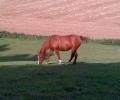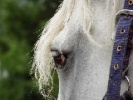| Author |
 Topic Topic  |
|
|
mittens
Platinum Member
    
 United Kingdom United Kingdom
2109 Posts |
 Posted - 11 Apr 2010 : 9:19:35 PM Posted - 11 Apr 2010 : 9:19:35 PM






|
|
Hi all,not been on here much as so many things going wrong at once but this concerns my mare. Three weeks ago she seemed really off colour and depressed,not showing the usual interest in her carrots;basically ignoring them. Still eating hard feed and haylage but I did think it could be her teeth so I called the vet to check her over. Teeth not bad and no sign of infection etc.Temperature normal. She took bloods and the result showed low white blood count. Further results showed liver problems and the prognosis was not good. She was put on antibiotic jabs daily and vitamin jabs every 5 days.She has lost weight. I wrote last year of the abundance of ragwort and my daily battle with the stuff but as I was pulling it up I had sectioned off the areas where it still was so the horses couldnt get through. Whinney however kept going through the electric to get to the field it was still in as there was lots of grass so perhaps inadvertently picked it up. Other horses all fine though. Whinney then went on to need 4 X 120ml orally syringed lactulose daily. sticky horrible stuff but vet said it would get rid of excess ammonia in her system to stop any brain damage as she seemed fuzzy and "drunk".Vet came again and said we should consider our only option to put her down as things will only get worse. We are all devasted,spoke to animal communicator and she picked up overnight and ate and drank normally and seemed fine,even vet agreed she looked "normal". Today she has gone all depressed again and we're at a loss. I dont feel ready to give up on her though.She's 14.She's also very itchy around head.I dont want her to suffer but where theres life theres hope and I still feel a fight in her.Any advice or suggested approaches? Wiped out the ragwort and not even a rosette now and plenty of grass as usual.Feel to blame as she obviously ate something of it despite our best efforts to keep her off,or could it be something else? Without a biopsy (very risky) we wont know for sure.
|
Avatar
My Contact Info
nrisby@btinternet.com |
|
Report to moderator
|
|
|
sunny
Silver Member
  

252 Posts |
 Posted - 11 Apr 2010 : 9:29:58 PM Posted - 11 Apr 2010 : 9:29:58 PM





|
| sorry to hear your news hope things turn out ok. I can't offer advice but best wishes to you |
South Lincolnshire |
Report to Moderator  |
|
|
katherineepea
Gold Member
   

England
883 Posts |
 Posted - 11 Apr 2010 : 9:46:19 PM Posted - 11 Apr 2010 : 9:46:19 PM





|
like you said, where theres life theres hope and you obviously care for her a great deal.
as long as she isnt suffering, keep fighting! |
Report to Moderator  |
|
|
Pasha
Platinum Member
    

England
3622 Posts |
 Posted - 11 Apr 2010 : 9:54:10 PM Posted - 11 Apr 2010 : 9:54:10 PM





|
| So sorry to hear this.... keeping fingers crossed she gets better x |
    |
Edited by - Pasha on 11 Apr 2010 9:54:30 PM |
Report to Moderator  |
|
|
RiffRaff
Silver Member
  

271 Posts |
 Posted - 11 Apr 2010 : 10:22:41 PM Posted - 11 Apr 2010 : 10:22:41 PM





|
I use a product by James Hart called Purify it flushes the liver and basically resets the system. It is a new zealand herbal product which is amazing and i would highly recommend giving it a go. As our vets are also at the end with my boy and this is keeping him going! I dont know what area you are in but can suggest where to get it from if you let me know.
Forgot to say it has been produced with ragwort poisoning in mind, although works for other things. |
Edited by - RiffRaff on 11 Apr 2010 10:23:37 PM |
Report to Moderator  |
|
|
georgiauk
Platinum Member
    
United Kingdom
2605 Posts |
 Posted - 11 Apr 2010 : 10:54:56 PM Posted - 11 Apr 2010 : 10:54:56 PM





|
| Milk Thistle, give her a few days of good drenches (make a tea with it) then add dry to her daily ration. Hope she picke up for you. |
Report to Moderator  |
|
|
RiffRaff
Silver Member
  

271 Posts |
 Posted - 11 Apr 2010 : 10:56:44 PM Posted - 11 Apr 2010 : 10:56:44 PM





|
| Oh yes milk thistle and also dandelion is very good. |
Report to Moderator  |
|
|
suyents
Platinum Member
    

United Kingdom
1651 Posts |
 Posted - 11 Apr 2010 : 11:12:43 PM Posted - 11 Apr 2010 : 11:12:43 PM





|
and..do you have any buttercups in your fields??
Milkthistle is excellen for liver function, as are clivers (now growing in the hedgerows) and dandelions..Use echinacea to boost her immune system too.
Hilton Herbs are my godsend. And keep using the milkthistle seeds for as long as ot takes to get her back...herbs take a few weeks to get into the system...Yeast may help as it will boost her vitamin B complex..What sort of "itchy"?? hate to ask but does she have lice?..good luck.
suyen |
     |
Report to Moderator  |
|
|
mittens
Platinum Member
    

United Kingdom
2109 Posts |
 Posted - 11 Apr 2010 : 11:52:18 PM Posted - 11 Apr 2010 : 11:52:18 PM






|
Thank you for such helpful advice.I have been in touch with Caroline Ingraham who uses plant oil therapy and powders.She sent me a parcel of carrot seed oil,dandelion root powder,rosehip shells,burdock root,seaweeed oil and liqourice powder.Whinney doesnt want to know,this has amazed Holly the animal communicator and is veering her away from liver being the starting point for her problems. She's showing aggression for the first time in all her 14 years (I bred her)which is upsetting as its a character trait so unlike her.I can appreciate all the tests she's been through have really dented her trust in people,including me as I'm the one leading her to the vet.As for lice I haven't ruled it out but no sign. Her head seems to be the main area as do her fetlocks which she lays down to bite,although I know self mutilation can occur in advanced liver disease it doesn't FEEL right.She has blistering around the muzzle which is driving her to distraction but as my arm became very itchy with the lactulose I'm wondering if its that,gonna apply aloe gel to soothe it tomorrow.No buttercups,but ants in abundance in certain parts of the paddock.Maybe this explains her lack of rolling today with her rug ON as yesterday one roll started a chain-rolling which made me think she was colicy but if her liver is that bad would the system cope with an anti inflam?!! Just back from night check and she's grazing next to the old 29 year old.Very keen to get hold of some of this stuff from NZ.I'm in Norfolk. Thanks again,its helped to get it on here as been going nuts but too stressed to talk about it.  Oh and yes,Milk Thistle I shall also try...I have some myself although this has put me right off the vino! Oh and yes,Milk Thistle I shall also try...I have some myself although this has put me right off the vino! |
Avatar
My Contact Info
nrisby@btinternet.com |
Edited by - mittens on 11 Apr 2010 11:54:51 PM |
Report to Moderator  |
|
|
Paresh
Gold Member
   

613 Posts |
 Posted - 12 Apr 2010 : 06:35:55 AM Posted - 12 Apr 2010 : 06:35:55 AM





|
| we had a pony with sever liver damamge and put her on global herbs restore which is a liver tonic, it worked wonders. Good luck and hope she gets better soon. |
     |
Report to Moderator  |
|
|
Goldenmane
Platinum Member
    

United Kingdom
4964 Posts |
 Posted - 12 Apr 2010 : 06:44:59 AM Posted - 12 Apr 2010 : 06:44:59 AM





|
No more advice to add, just sending you both a big hug
PS The aggression is probably from her feeling uncomfortable and unwell. |
 |
Report to Moderator  |
|
|
Pauline
Platinum Member
    

England
3185 Posts |
 Posted - 12 Apr 2010 : 08:32:01 AM Posted - 12 Apr 2010 : 08:32:01 AM








|
Talk to Roger Hatch from "Trinity Consultants" his number is 01243 551766.
Roger helped me with my little New forest mare "Honey" who was seriously ill earlier this year.
Hope things are better this morning.
Pauline  |
Pauline Higgs
Equine & Human Holistic Therapist
www.thegentlestouch.co.cc
www.endurancegbmidsouth.co.uk
Berkshire / Hampshire Border |
Report to Moderator  |
|
|
wizzy
Silver Member
  
United Kingdom
424 Posts |
|
|
Pop
Platinum Member
    

England
3051 Posts |
 Posted - 12 Apr 2010 : 09:07:55 AM Posted - 12 Apr 2010 : 09:07:55 AM





|
Hi
Would be interesting to see the liver profile results. When the vet checked her teeth, did she notice yellow gums.
Equisup is very good for liver problems.
Aggression is a symptom of the liver problem rather than feeling miserable about being ill.
I have a pony who did the West Wycombe ride and enjoyed herself no end, 2 years ago I had a vet waving the PTS needle at her due to liver problems, obviously it depends on how advanced it is and the cause.
If she was getting into thru the fence she was probably eating the nice grass. Problem with ragwort is that if you get a horse who likes it, then you think you dont have any because they are eating it. Some get a taste for it. My heart goes out to you.
This is interesting:
Hepatic encephalopathy is associated with behavioral changes in horses, ruminants, and swine. The severity of hepatic encephalopathy often reflects the degree of hepatic failure but does not differentiate between acute or chronic liver failure. Signs of hepatic encephalopathy range from nonspecific depression and lethargy to head pressing, circling, aimless walking, dysphagia, ataxia, dysmetria, persistent yawning, increased friendliness, aggressiveness, vicious behavior, stupor, seizures, or coma. Pharyngeal or laryngeal collapse with loud, stertorous inspiratory noises and dyspnea occurs in some cases of hepatic failure, especially in ponies. The pathogenesis of hepatic encephalopathy is unknown, but proposed theories include ammonia as a neurotoxin, alterations in monoamine neurotransmission (serotonin, tryptophan) or catecholamine neurotransmitters, imbalance between aromatic and short branch chain amino acids resulting in increased inhibitory neurotransmitters (ã-aminobutyric acid, L-glutamate), neuroinhibition due to increased cerebral levels of endogenous benzodiazepine-like substances, increased permeability of the blood-brain barrier, and impaired CNS energy metabolism. Although the signs can be dramatic, hepatic encephalopathy is potentially reversible if the underlying hepatic disease is resolved.
Photosensitization, which can be seen with acute or chronic liver failure, must be differentiated from primary photosensitization ( Photosensitization: Introduction). Hepatogenous photosensitization develops when compromised hepatic function results in phylloerythrin, a photodynamic metabolite of chlorophyll, entering the skin. Phylloerythrin in the skin reacts with ultraviolet light and releases energy, causing inflammation and skin damage. Signs of photosensitization are varied but include uneasiness, pain, pruritus, mild to severe dermatitis with erythema, extensive subcutaneous edema, skin ulceration, sloughing of skin and ophthalmia with lacrimation, photophobia, and corneal cloudiness. Dermatitis and edema are particularly evident on nonpigmented, light-colored or hairless areas of the body and areas exposed to sun. Mucocutaneous junctions and patches of white hair are the most common sites of photosensitization in cattle. Occasionally, the underside of the tongue may be affected. Blindness, pyoderma, loss of condition, and occasionally death are possible sequelae. Pruritus may result from photosensitization or from deposition of bile salts in the skin secondary to alterations in hepatic excretion.
Diarrhea or constipation may be seen in animals with hepatic disease. Diarrhea is more commonly seen in cattle than in horses with chronic liver disease or in animals with chronic fascioliasis and hepatotoxic plant poisonings. Ponies and horses with hyperlipemia and hepatic failure may develop diarrhea, laminitis, and ventral edema. Some animals with liver disease have alternating diarrhea and constipation. Horses with liver failure and hepatic encephalopathy frequently develop colonic impaction due to decreased water intake. Constipation is characteristic of Lantana poisoning in goats and other ruminants.
Recurrent colic, intermittent fever, icterus, weight loss, and hepatic encephalopathy may be seen in horses with choleliths that obstruct the common bile duct. Infectious or inflammatory hepatic disease or failure of the liver to prevent endotoxin from gaining access to the systemic circulation may also result in intermittent fever and colic. Abdominal pain, due to pressure on the liver capsule from parenchymal swelling, often is seen in animals with acute diffuse hepatitis or trauma to the capsule itself. Affected animals stand with an arched back, are reluctant to move, or show signs of colic. In ruminants, pain may be localized to the liver by palpation over the anterior ventrolateral aspect of the abdomen or the last few ribs on the right side. Tenesmus followed by rectal prolapse is seen in some ruminants with liver disease. It may be associated with diarrhea, hepatic encephalopathy, or edema of the bowel from portal hypertension.
Hypoalbuminemia is not as frequently associated with liver disease in horses as previously thought. Due to the long half-life (19 days) and liver reserve for albumin production, hypoalbuminemia is usually a very late event in the disease process. Serum total protein concentrations may be normal or elevated due to an increase in â-globulins in horses with liver disease. Hypoalbuminemia and hypoproteinemia most commonly develop in chronic liver disease, and they are common findings in llamas with liver disease. Generalized ascites or dependent edema may result. Ascites is related to portal hypertension caused by venous blockage and increased hydrostatic pressure and to protein leakage into the peritoneal cavity. The abdominal fluid present with liver disease usually is a modified transudate. Hypoalbuminemia can aggravate the ascites, but if it is seen alone, it more likely will cause intermandibular, brisket, or ventral edema. Ascites is difficult to appreciate in horses and adult cattle unless it is extensive. Ascites is a common finding in calves with liver cirrhosis.
Anemia may be seen in animals with liver dysfunction due to parasitic diseases, chronic copper toxicity, some plant poisonings, or chronic inflammatory disease. Anemia in acute fascioliasis results from severe hemorrhage into the peritoneal cavity as the larvae penetrate the liver capsule. Trauma and feeding activity of adult flukes within the bile ducts cause anemia and hypoproteinemia in animals with chronic fascioliasis. Chronic inflammatory disease (eg, hepatic abscesses, neoplasia) may cause anemia without accompanying hypoproteinemia.
Clinical signs of severe or terminal hepatic failure include coagulopathies and hemorrhage due to decreased production of clotting factors by the liver and possibly increased utilization in septic or inflammatory processes. A prolonged prothrombin time is usually seen first because factor VII has the shortest plasma half-life. Horses may develop a terminal hemolytic crisis caused by increased RBC fragility. This has not been reported in ruminants.
Fecal color rarely changes in adult herbivores with liver disease. In young ruminants and monogastric animals, cholestasis may result in lighter color feces being passed due to loss of stercobilin, a metabolite of bilirubin.
Liver disease should always be considered when nonspecific clinical signs, such as depression, weight loss, intermittent fever, and recurrent colic, are present without an apparent cause. Differentiation between acute and chronic hepatitis or failure based on the duration of clinical signs before presentation may be misleading because the disease process is often advanced before clinical signs are evident. Early vague signs of depression and decreased appetite may be overlooked. Liver biopsy to determine the type of pathology, degree of hepatic fibrosis present, and the regenerative capabilities of the liver parenchyma is necessary for developing a treatment plan and giving an accurate prognosis.
|
      |
Report to Moderator  |
|
|
mittens
Platinum Member
    

United Kingdom
2109 Posts |
 Posted - 12 Apr 2010 : 09:54:07 AM Posted - 12 Apr 2010 : 09:54:07 AM






|
| Very interesting article and heightens the importance of a biopsy.I shall be making some calls today to the people you have all recommended and hope they can ship stuff out pretty quick.She's not showing much interest in her feed this morning so anything I might give her will need to be orally syringed....great,she'll love me even more! The last results showed jaundice. Are vets usually so quick to give the worst diagnosis possible or do they feel its in the animals best interest to "put it out of its misery"? She has broken two fences as she just barges straight into them,(non-electrified electric" whereas prior to all this she respected it as a boundary.Some days are better than others. The vet recommended a high fibre high sugar diet but surely high sugar can lead to many other complications? Don't know whether to get vet out to give another B vit jab to boost her up a bit again before the other things arrive. She'll take one look at her sore muzzle and tell us we're mad keeping her going. She's still grazing on and off though and is drinking. Wish us luck! |
Avatar
My Contact Info
nrisby@btinternet.com |
Report to Moderator  |
|
|
mittens
Platinum Member
    

United Kingdom
2109 Posts |
 Posted - 12 Apr 2010 : 09:58:09 AM Posted - 12 Apr 2010 : 09:58:09 AM






|
| Oh and no yellow gums but sliht tinge to eyes which makes me think I'm seriously clutching at straws here!Can't stand the thought of losing her but neither can I see her quality of life deteriorating |
Avatar
My Contact Info
nrisby@btinternet.com |
Report to Moderator  |
|
|
justine
Gold Member
   

England
641 Posts |
 Posted - 12 Apr 2010 : 10:40:49 AM Posted - 12 Apr 2010 : 10:40:49 AM





|
Can only tell you of a neighbours experience of ragwort/liver disease.
His shire horse went down hill rapid over 3 weeks. The vet thought it was infection so administered AB`s. The horse was dead in hours. The liver could not take the AB`s it was so bad. PM ragwort induced liver disease.
So perhaps if your horse can stand medication right now and no sign of yellow gums/eyes he may have not reached the critical stage.
Hope he recovers very soon. |
jbassindale |
Report to Moderator  |
|
|
nat
Bronze Member
 

England
52 Posts |
 Posted - 12 Apr 2010 : 10:41:52 AM Posted - 12 Apr 2010 : 10:41:52 AM






|
Hi
Sorry to hear about your horse. When our horses got ill with botulisim phillipa was a great help
This is her contact address and phone number
Philippa Rodale at: Weatherbury Veterinary Clinic, The Square, Puddletown, Dorchester DT2 8SH: Tel: 01305 848221
nat
eta:
she uses homeopathy as well |
|
Edited by - nat on 12 Apr 2010 12:12:12 PM |
Report to Moderator  |
|
|
marionpack
Gold Member
   
England
1073 Posts |
 Posted - 12 Apr 2010 : 11:23:15 AM Posted - 12 Apr 2010 : 11:23:15 AM





|
| Can't offer any advice but know how worried you must be, fingers crossed that you will find something that will work out of all the stuff that has been recommended |
Berkshire
   
|
Report to Moderator  |
|
|
precious
Platinum Member
    

England
2253 Posts |
 Posted - 12 Apr 2010 : 12:23:28 PM Posted - 12 Apr 2010 : 12:23:28 PM






|
mittens hope she improves soon x
Give roger a call paulines post he is excellent x |
     
Gemma Thompson
Birmingham West Midlands
|
Report to Moderator  |
|
|
Esther
Gold Member
   

United Kingdom
866 Posts |
 Posted - 12 Apr 2010 : 12:48:23 PM Posted - 12 Apr 2010 : 12:48:23 PM





|
I was going to say call Roger Hatch but others have beaten me to it. The L94 from Trinity was a lifesaver for our old TB, Joe.
Joe had acute liver failure three winters ago - very scary, dropped to condition score 1 in about two weeks. The problem is with liver failure is that because a horse can function perfectly fine with 70%+ damage without showing any external signs at all, once they do show signs it's generally very rapid deterioration.
What you are aiming to do is boost the remaining healthy bit of liver and keep the work it actually has to do to a minimum. They need a high fibre low protein diet. However, before we got the diagnosis back we unknowingly actually contributed to his deterioration as all the high oil high calorie food we were packing into him to try and get him to pick up was making his damaged liver work too hard and was thus making him worse.
These last couple of years since the bad attack he's got through the winter looking like an old TB, but not like a neglect case. And he's been in rude health in himself, which is great to see as we really did think we were going to lose him. When the vet last saw him he said if he didn't know he'd put his age at 16, not 24. His coat is probably the best out of all ours at the moment, and yet he's wintered out with just ad lib hay. He's currently enjoying retirement with all the bay mares he could wish for... |
paranoid horsemother
 
Photo on far right thanks to West End Photography
|
Report to Moderator  |
|
|
barbara.gregory
Platinum Member
    
United Kingdom
4531 Posts |
 Posted - 13 Apr 2010 : 12:44:48 PM Posted - 13 Apr 2010 : 12:44:48 PM





|
If you have to syringe medication into him I find mixing it with runny honey usually does the trick as they like the honey. I can get mine who won't eat food with antibiotics in to swallow it by mixing it with honey and using a 60mL syringe (filled twice)!
Good luck but sadly if it is ragwort the liver doesn't really recover completely. It may not be so fingers crossed. My hay supplier has a pony with liver damage, probably from worms before he got him, and he is holding his own but isn't too bad.
Barbara |
    |
Report to Moderator  |
|
|
angel2002
Platinum Member
    

United Kingdom
2502 Posts |
 Posted - 13 Apr 2010 : 1:03:22 PM Posted - 13 Apr 2010 : 1:03:22 PM





|
Mittens, PLEASE get a liver biopsy done. There is nothing dangerous about it.
My mare had suspected liver disease a couple of years ago, she had a scan and a biopsy done, at home by my vet and it actually turned out she had a lower bile duct infection! Don't know what caused it and all other horses were fine, took a year to get her back up to weight but she is fine now (touch wood!)
Please, please, please, don't hang around waiting to see if alternative/herbal remedies work, get the scan and biopsy done.....
All crossed for your mare xx |
Angel
Passion Arabians
    |
Edited by - angel2002 on 14 Apr 2010 12:50:58 PM |
Report to Moderator  |
|
|
mittens
Platinum Member
    

United Kingdom
2109 Posts |
 Posted - 13 Apr 2010 : 11:47:14 PM Posted - 13 Apr 2010 : 11:47:14 PM






|
| Roger has put L94 in the post,should be here tomorrow,ten days and see what happens! Angel what symptoms did your mare have when the liver diagnosis was made? Are there many other conditions which manifest in the same way? I've been wondering if its something she's been harbouring for a while which had gradually affected the liver rather than the other way about but,like you say,a biopsy will rule out anything else.Our problem is a lack of stable yard so all procedures would have to happen in the paddock and at this stage I'm not happy about travelling her as she can be a little unsteady at times. I will speak to the vet though and get some more info.Tonight she ate tea at 4.30 and another small feed about an hour ago and looks a little brighter in the eyes today. |
Avatar
My Contact Info
nrisby@btinternet.com |
Report to Moderator  |
|
|
saddlebred
Platinum Member
    
United Kingdom
1706 Posts |
 Posted - 14 Apr 2010 : 07:02:06 AM Posted - 14 Apr 2010 : 07:02:06 AM





|
| I am keeping everything crossed for your mare Mittens. |
Based Bewdley Worcs |
Report to Moderator  |
|
|
mogwai
Platinum Member
    

England
2717 Posts |
 Posted - 14 Apr 2010 : 09:39:30 AM Posted - 14 Apr 2010 : 09:39:30 AM





|
Roger is fabulous!!! I was at my wits end last year with my then 3 year old with liver disease. It was roger's L94, and now black gold that kick started her recovery. Prior tlo that things were lkooking pretty desperate.
i would also echo angel's advice about the biopsy. I was concerned about ruby having one, but she did and she came through it very well indeed. More over it gave us a specific diagnosis (choloangiohepatitis, no fibrosis. So infection, not caused by ragwort and no permanent damage). She could then be prescribed a long course of antibiotics. However, her progress was painstakingly slow until i contacted roger. Within 2 weeks of starting her on the L94 her results were almost normal (i have no doubt the antibiotis got rid of the infection, but it was the L94 that got her liver functioning normally again). She has now had 2 clear liver function tests, following a year of raised enzymes previously.
All the best with her
xxx |
Report to Moderator  |
|
 Topic Topic  |
|

